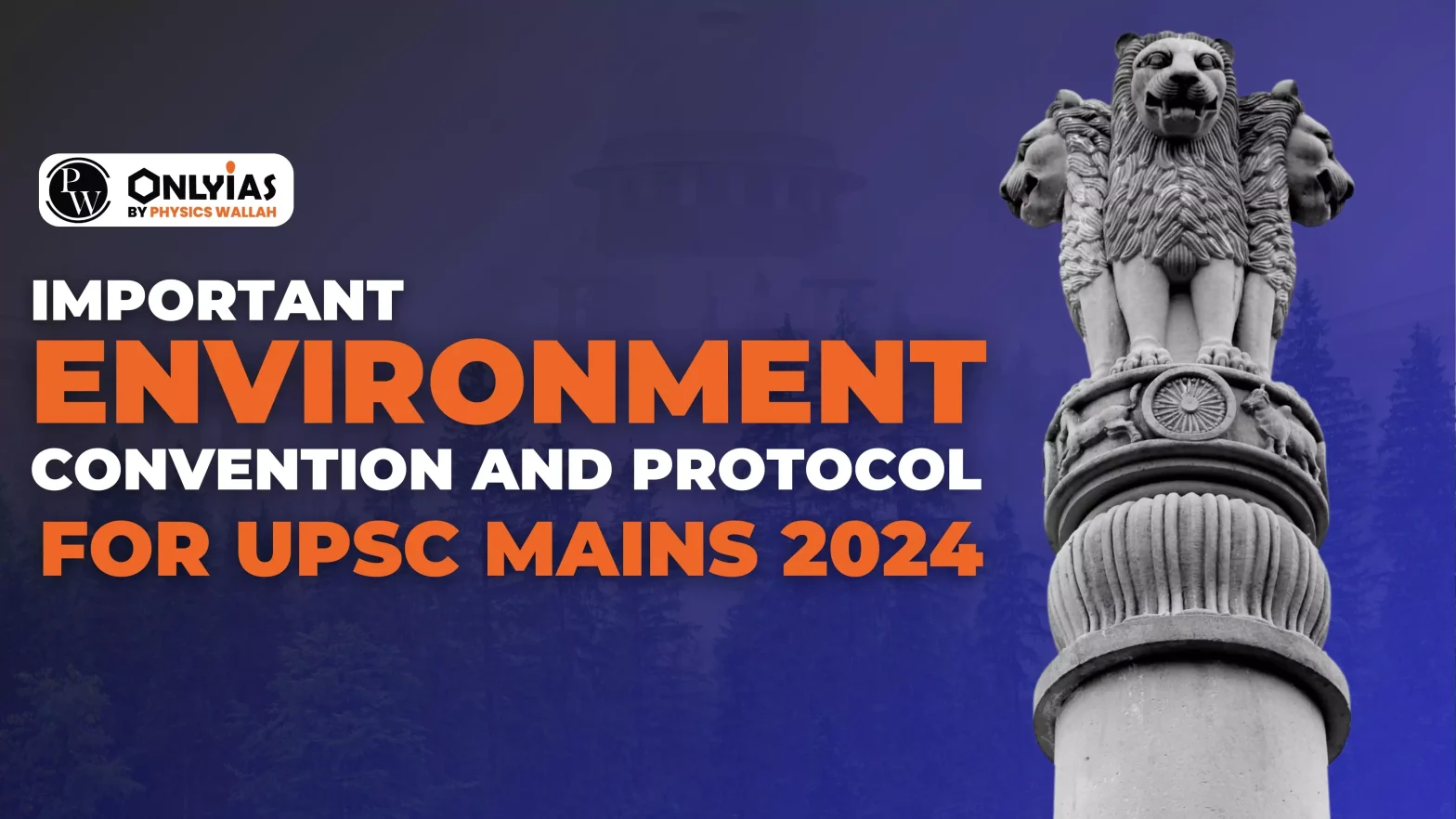The Environment Conventions and Protocols for UPSC are important subjects. Learn about Important Environment Conventions and Protocols for UPSC Mains 2024 in this detailed guide.

Important Environment Convention and Protocol for UPSC Mains 2024 – Environment Conventions act as safeguards and systems for environmental protection. To safeguard different environmental components, there are several conventions and protocols. Numerous organisations have environmental issues as one of their top priorities. The United Nations, which was established in 1945 following World War II, oversaw several international projects that required cross-border coordination and collaboration. As the UN body responsible for environmental issues and policy, the UNEP deals with these problems and regulations.
For the UPSC Mains 2024 GS III exam, it is essential to comprehend important environmental conventions and protocols. Candidates should study Environment Conventions and Protocols for UPSC Mains since they are important in global environmental governance.
Answering questions in the environment part will be made easier if you are familiar with these conventions and their objectives. Here is a collection of significant Environment Conventions and Protocols for UPSC Mains 2024 that might help you do well in this section of the exam.
One In this article, we have discussed the Important Environment Convention and Protocol for UPSC Mains 2024.
For the UPSC Mains GS III paper, environment convention and protocol is a high-yield subject. Although Environment Conventions and Protocols are sometimes mistaken for one another, they have different functions:
In both the preliminary and main sections of the UPSC examination, the environment section has several questions. One of UPSC Mains GS III’s most crucial topics on environment and ecology is International Environmental Conventions and Protocols. This article provides a collection of important environmental conventions and protocols for UPSC Mains 2024.
The table below provides a list of Environmental issues for UPSC mains throughout the world.
List of Environmental Conventions
Name
Year of Establishment
Details
COP28
2023
Expo City, Dubai in the United Arab Emirates (UAE) hosted the 28th session of the Conference of the Parties (COP28) to the UN Framework Convention on Climate Change (UNFCCC) in 2023.
COP27
2022
COP27 in Sharm el-Sheikh, Egypt, concluded on 20 November, 2022 with a historic decision to establish a loss and damage fund, which UN Secretary-General António Guterres called essential.
COP26
2022
COP26 in Glasgow brought together 120 world leaders and over 40,000 participants, focusing on climate change for two weeks in 2021.
COP25
2019
UNFCC COP25 took place under the Presidency of the Government of Chile and was held with logistical support from the Government of Spain. Three things have been made clear at COP25.
Kigali Amendment
2016
Paris Agreement
2015
Minamata Convention
2013
Nagoya Protocol
2010
UN-REDD
2008
Stockholm Convention
2001
Cartagena Protocol on Biosafety
2000
Rotterdam Convention
1998
Kyoto Protocol
1997
UNCCD
1994
United Nations Framework Convention on Climate Change for UPSC Mains (UNFCCC)
1992
Rio Summit
1992
Biological Diversity Convention for UPSC Mains
1992
Basel Convention
1989
Montreal Protocol
1987
Vienna Convention
1985
Bonn Convention
1979
CITES
1973
Ramsar Convention
1971
UPSC Mains candidates can readily respond to queries about Environmental issues for UPSC mains by being familiar with key norms and procedures.
Enrol in Physics Wallah’s online courses. The UPSC courses are designed by experts to help you ace the UPSC exams. Sign up now and take the first step towards your dream career!
| Related Articles | |
| International Day of Cooperatives 2024 | World Biofuel Day 2024 |
| World Lion Day 2024 | National Handloom Day |
| International Youth Day 2024 | Global Hepatitis Report 2024 |
A particular way of altering a convention is using a protocol. Not every state that accepted the original convention is required to follow the protocol modifications. States that ratify the new protocol are the only ones required to follow its changes.
The Kyoto Protocol is an agreement under the UNFCCC that binds parties to stabilising greenhouse gas emissions. The UNFCCC provides a framework convention for doing so.
A sort of treaty binding under international law that enables them to accomplish an environmental aim is an international environmental agreement, often known as an environmental protocol.
A convention is a legally binding agreement between nations that is often negotiated through an international agency. One method of altering a convention is using a protocol. Not every state that accepted the original convention is required to follow the protocol modifications.
<div class="new-fform">
</div>